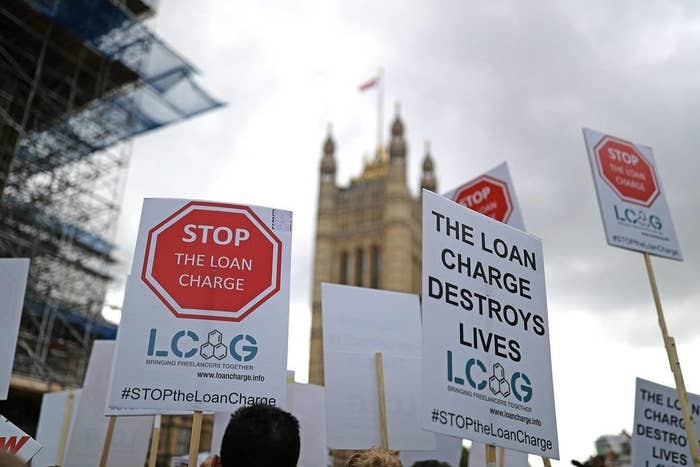
People facing huge tax demands under the controversial loan charge policy have accused HM Revenue and Customs of “gaslighting” them and inflicting “mental waterboarding” through insensitively timed letters and unnecessary delays.
MPs on the loan charge all-party parliamentary group (APPG) heard from five witnesses who hit out at the way the taxman had handled their cases, which they said had caused immense stress and anxiety.
The hearing, which BuzzFeed News attended, followed an independent review in December by Sir Amyas Morse, former chief of the National Audit Office, that found the policy — which has been linked to several suicides — had caused people "serious distress”.
The loan charge policy saw around 50,000 freelancers facing demands for life-altering amounts of tax going back up to 20 years. The government said these people had avoided tax by using loan schemes, now called “disguised remuneration schemes”, to be paid.
But the reality is more complex: Many workers were assured by accountants at the time that what they were doing was legal and submitted tax returns year after year with no comeback from HMRC.
The government made changes to the policy following the Morse review; mainly that the loan charge would only apply to people who used the schemes after 2010 and wouldn’t go back 20 years as before.
This, however, is still seen as a retrospective measure, which critics have said goes against the rule of law. Some 40,000 people will still be affected.
The five witnesses in front of the APPG all said the review had not helped them. And they criticised HMRC’s tactics in pursuing them for huge amounts of money they are adamant they do not owe.
Katherine, who requested that only her first name be reported, settled with HMRC for around £400,000 in 2018 by selling her home. The financial services worker said she was put under “intense and relentless” pressure to settle.
“They systematically sent letters out at sensitive times,” she told MPs. “No letter ever arrived on a day other than a Friday, [it was] usually on a bank holiday or at Christmas and Easter, always at a time when you could do nothing about it immediately. It triggers something because it went on for years.”
Her voice breaking with emotion, she went on: “They would make mistakes which I believe were deliberate because there were so many of them. They would send them predated so by the time they arrived, the time limit had already expired.
“And then it would take you two hours on the phone to get through to somebody so you would write and you don’t hear anything. And you were in limbo because you don’t know if you’ve got any extra time.
“Then you get a letter from the debt recovery arm when you don’t have a debt. Then you were pushed from pillar to post and three weeks later you’d speak to someone and they say ‘Oh yes sorry that was sent out in error’. That kind of thing was routine throughout the whole period. I don’t think they behaved well and properly.”
John, an IT contractor who used a pseudonym, added: “It was gaslighting.”
HMRC vehemently denied these allegations, telling BuzzFeed News: “This bizarre claim is simply not true. It is entirely false to suggest that HMRC selects personal dates when it contacts customers.”

Another witness called Gus, an engineer who also requested that we only report his first name, told MPs he received a letter from HMRC on Friday 20th December telling him he would be made bankrupt if he did not settle by the 18th December — two days earlier.
“I had written to them two days before that where I explained the impact it was having and I received a letter saying ‘We’ll get back to you’ and I’m still waiting,” he said. “It feels like mental waterboarding, this constant application of pressure bears you down.”
Steve Packham, spokesperson for the Loan Charge Action Group (LCAG), said HMRC was wrong to “dismiss vulnerable people” by denying their experiences.
“Many LCAG members have reported letters demanding payment and even threatening bankruptcy at sensitive times, especially just before Christmas, which shows how callous HMRC is in dealing with people,” he said.
“Letters also seem to arrive on Fridays, meaning many people get them after work and find they can’t then make contact with HMRC for two or three days, which further increases anxiety.”
The witnesses also hit out at the Morse review for allowing HMRC to demand money for schemes dating back to 2010. John said: “I thought retrospectivity wasn’t OK apart from very exceptional circumstances.”
Gus added: “We’ve had an HMRC that’s been asleep at the wheel for 20 years. We are paying the price for their inactivity. We’re being used as a scapegoat for their inactivity.”
HMRC rejected this, pointing to a written ministerial statement on the issue in 2004 and legislation to tackle this form of tax avoidance in 2011. They said that even with that action, the loan schemes continued to proliferate.
Asked by one MP what they would most like to see happen, an agency social worker who used the name Maggie — who has been told she owes £40,000 — said: “I’d just like it go away and not owe tens of thousands of pounds.”
Gus, who faces a tax demand of £90,000, said: “I’d like not to feel like a criminal.” John added: “I want to be rehumanised.”
In a report last year, the loan charge APPG — which now has more than 190 MPs from all parties including a number of senior Conservatives — called for an urgent investigation of “HMRC’s use of suggestive, and possibly misleading, language in their communications with taxpayers”.
They said they had received reports from people outlining “HMRC’s usage of the behavioural psychology techniques to ‘nudge’ taxpayers into settling disputes”.
“The evidence we received clearly shows that HMRC’s whole approach is a direct cause of the acute anxiety and stress people subject to the loan charge are experiencing,” the report from April 2019 said.
Business and IT workers, engineers, social workers, nurses, and locum doctors have been caught up in the policy. Under the loan scheme, a worker’s pay was diverted to an offshore trust, which gave the worker a loan that was typically not repaid. The government says this allowed people to sidestep large amounts of tax and national insurance.
In a fresh crackdown on alleged tax avoidance in 2016, HMRC was given the power to recoup tax from workers who had used these schemes, going back 20 years. This became law in the 2017 Finance Act — but critics say it received very little scrutiny in Parliament at the time.
In 2018, contractors were sent letters telling them to add up all their loans from trusts since 1999 and make an offer to settle the tax that HMRC claimed should have been paid. For many, this was the first time they were told they had done something wrong.
Those who failed to agree to a settlement now face the loan charge: effectively the total of tax-free loans received over the past two decades, taxed as income all in one year, 2018–19.
